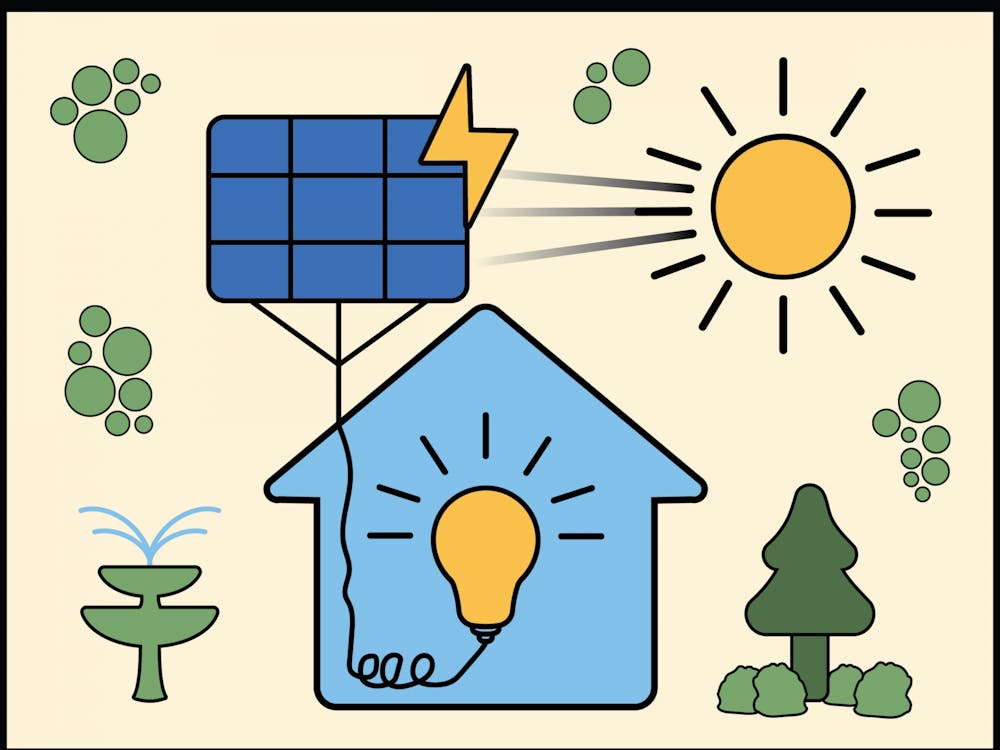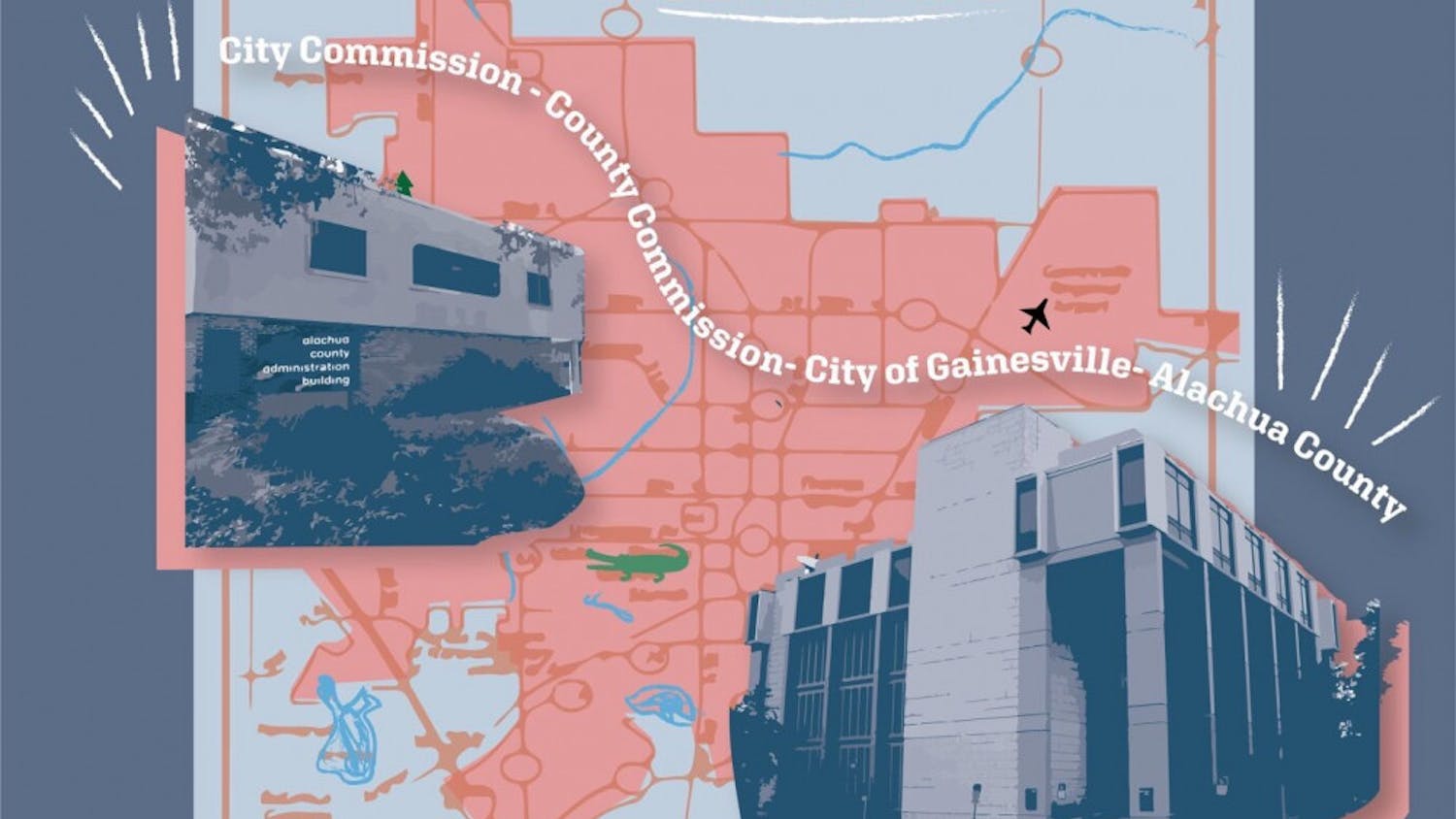After over a year of contract negotiations, the Gainesville City Commission has decided to temporarily halt plans to build a solar plant, called the Sand Bluff Solar Project, until it receives approval from a state committee.
The plant was meant to be built in Archer, a rural town about 13 miles south of Gainesville, by early 2025, supplying Gainesville with nearly 80% clean energy combined with the biomass plant, another controversial source of renewable energy the city bought in 2017. However, the state Joint Legislative Auditing Committee is reviewing the solar contract, as well as several other Gainesville Regional Utilities projects, due to the city’s $1.7 billion debt.
But stalling the plant might be for the best, Archer resident Scott Sloan said.
“I like the idea of renewable energy,” Sloan said. “But it has to be in the right spot and done in the right way.”
Sloan, 46, doesn’t understand why the plant needs to be built in Archer if it will be servicing Gainesville and the surrounding area.
Archer residents won’t benefit from it, he said. In fact, it might be harmful — property values can decrease when a solar plant is built near a residential area, according to a study from the University of Rhode Island.
This latest project is indicative of Gainesville treating Archer as a “waste basket,” Sloan said.
The original site for the GRU solar plant was in close proximity to a historic Black graveyard, but the Alachua County Commission voted against building the solar plant there last July, and the site was moved near Whitehurst Lodge and St. Joseph’s Church.
Gainesville needs to work to rebuild trust, Sloan said.
Sloan has also witnessed multiple plans to build solar plants fall through in Archer since he moved there in 2019. One of those was when Duke Energy, a large private utility company, attempted to build a solar plant a hundred feet away from his home in 2020.
The original site was also across the street from a historically Black church, Banks United Methodist Church. Sloan worked with the congregation and its pastor to push back against the project, and it was shut down.
Archer also experienced a second attempt from Duke Energy to build a smaller solar plant, but it was stopped by residents near the spot as well. Sloan sees this new GRU plant as following Duke Energy’s heels, he said.
“When you talk to people at the grocery store, the library or the post office, there’s an underlying tone in the conversation that Archer is a dumping ground,” Sloan said.
He was satisfied when he heard the City Commission had decided to move the new location, he said. But he’s still not sure how much he trusts it to make the right choices for Archer moving forward.
Sloan’s opinions are shared by other residents, too. In an Archer community Facebook group with 1,500 members, a post about the solar plant garnered over 20 comments from angered residents.
While Sloan is generally in favor of renewable energy projects, he doesn’t like this ongoing relationship between Archer and utility companies, whether private or public, he said. He thinks there are plenty of other alternatives for solar plants closer to Gainesville, such as suburban areas like Oakmont.
But compared to Archer, the people in Oakmont are in a higher tax bracket, he said.
“All those people over there have a lot of money, and they would certainly fight it,” Sloan said. “So, I would imagine that they’re looking for a place where they’re not going to get a lot of pushback.”
However, Mayor Harvey Ward thinks the company building the solar plant, Origis Energy, has done enough community outreach with the people surrounding the new site. He feels confident it will go over well, he said.
“What people a few miles away are thinking and feeling, I don’t know,” Ward said. “But I do know that folks who live directly around it seem to have said yes.”
Ward is open to the idea of expanding GRU’s coverage area to Archer, he said. He understands the town’s apprehension, but he’s comfortable with the amount of thought put into picking the new site after hearing from Archer residents.
He also thinks it’s likely the solar plant will move forward, given the long term financial benefits for the city — including more consistent prices, he said.
Gainesville residents do stand to gain from this solar plant, said Jonathan Scheffe, UF professor and solar researcher. The implementation of a solar plant for a municipal utility could steady electricity rates, because solar prices do not spike in the same way natural gas does.
Whether an oil company is able to find a new deposit or not, the sun will shine regardless, Sheffe said.
“Solar has been proven to be a cheap technology to produce power,” Scheffe said. “You’re set for an extended period of time and can pretty much guarantee what those costs are going to be.”
This could be an improvement for GRU due to unsustainable price hikes in the past, Scheffe said. The regional utility has struggled with maintaining steady rates, resulting in protests.
However, Gainesville will still need to use an alternative resource even with enough solar power to provide electricity to the whole area, Scheffe said. The technology to store solar power in batteries once the sun goes down is still developing, an area Scheffe has chosen to specialize in with his research.
The Sand Bluff Solar Project does come with a 12 megawatt-per-hour battery storage system. The amount will cover transitions from renewable to non-renewable energy at night and during overcast days. But the vision of Gainesville powered by solar energy completely will have to wait for science to catch up, Scheffe said.
“I think there’s enough solar resource to provide power to the city of Gainesville,” Scheffe said. “It’s just a matter of figuring out how to store it effectively.”
However, Commissioner Cynthia Chestnut is apprehensive about the idea of building the solar plant — or any large-scale GRU projects, she said. Given the current situation where it's already struggling with debt, she doesn’t want to do anything that would jeopardize GRU’s finances further.
Chestnut originally made a motion not to approve the Sand Bluff Solar Project last March during a City Commission meeting, but it failed. She expressed her objections there too, citing concerns about the fact that Origis Energy is legally allowed to redact parts of its contract with the city until it agrees to work with the company.
She thinks it might result in another infamous deal like the 2017 biomass plant purchase, which plunged GRU further into debt, Chestnut said.
“I’m interested in the predictability, the cost and the accountability,” she said. “I have a fear right now voting for anything that is going to be that long term.”
The state’s Joint Legislative Auditing Committee will be able to view the contract in full now that the City Commission has approved its involvement with Origis. The commission will discuss the contract April 20.
Contact Siena at sduncan@alligator.org. Follow her on Twitter @SienaDuncan.

Siena Duncan is the Fall 2024 Editor-in-Chief of the Alligator. She's interned for the Salt Lake Tribune, the Tampa Bay Times and POLITICO. In her spare time, she loves to take walks to see the cows by her apartment and add more to her sketchbook.






